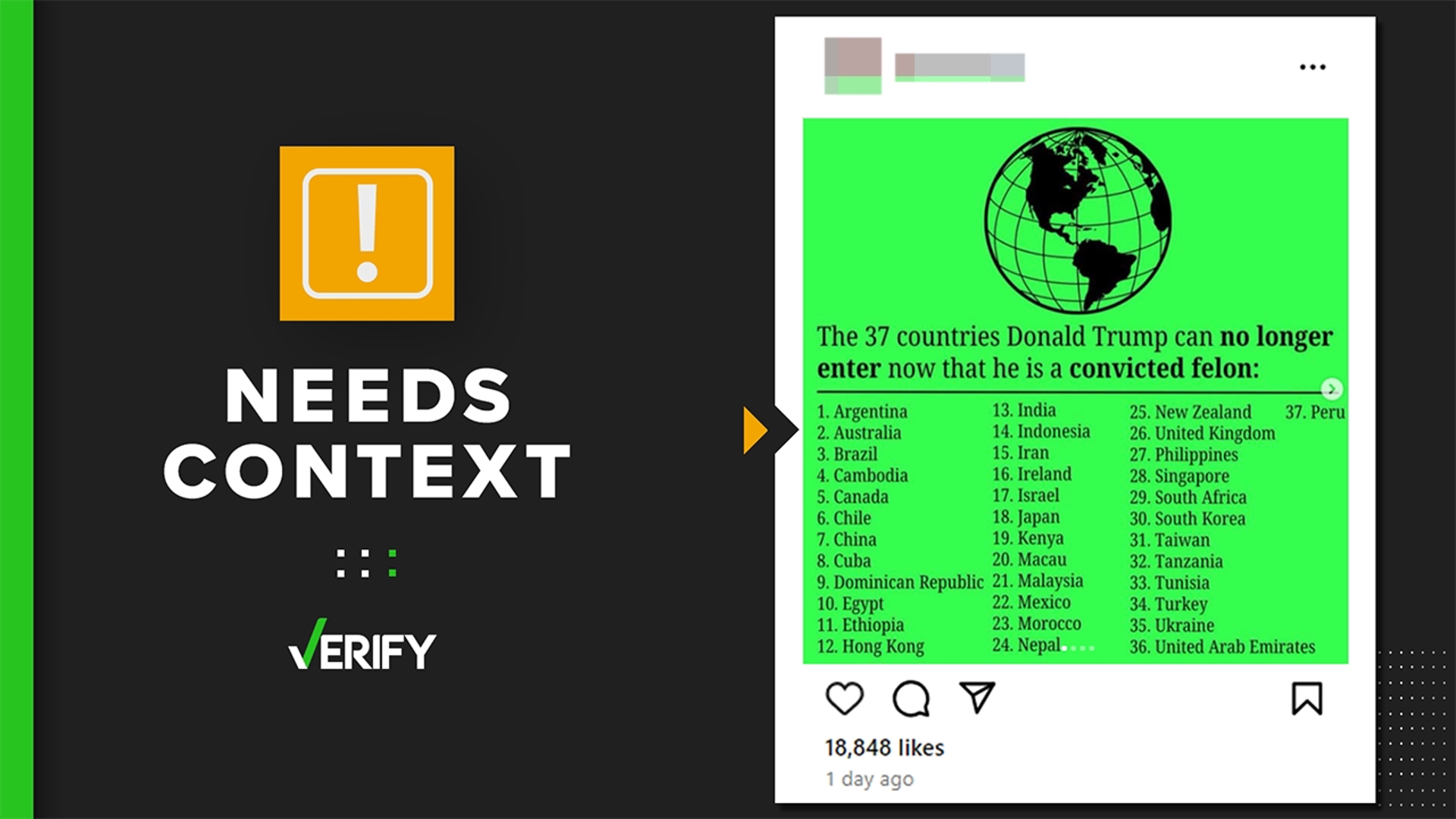Former President Donald Trump was recently convicted on 34 counts of falsifying business records in New York.
As a result, many people have questions about what the 2024 presidential candidate can and cannot do as a felon. Several social media posts claim Trump will no longer be able to travel to at least 37 countries as a result of the conviction.
Multiple VERIFY readers, including Diane, reached out to ask if it's true that a convicted felon in the United States cannot visit other countries.
THE QUESTION
Is Donald Trump no longer able to visit 37 countries as a convicted felon?
THE SOURCES
THE ANSWER
While several countries restrict convicted felons from entering, some admit felons on a case-by-case basis. Trump would need to receive approval to enter those countries, and it is currently unclear how countries will respond to entry requests from the former president.
WHAT WE FOUND
At least 10 countries have laws that restrict convicted felons from entering their country. Some countries have laws that allow immigration officials to use their discretion or admit felons based on the type of crime committed or how long it has been since the individual was convicted.
International travel restrictions
Travel restrictions for U.S. residents convicted of felonies vary depending on the country. Some countries may admit convicted felons on a case-by-case basis, depending on the type of crime they committed and the length of their sentence.
For example, in Mexico, immigration authorities have the option to turn away convicted felons if “they have been charged with or convicted of a serious crime in Mexico or elsewhere,” the Department of State says.
Canada has an immigration law that restricts people who have been convicted of a crime from entering the country. However, some convicted felons may still be able to enter Canada if they meet certain criteria “depending on the crime, how long ago it was” and how the person has behaved since commiting the crime, the Government of Canada says.
For example, if a person committed the crime when they were under 18 or the person has been “deemed rehabilitated” by immigration officials, it is possible they may still be able to enter Canada, the Government of Canada explains.
Australia also restricts convicted felons from visiting the country, but it's up to government officials to determine if the committed felony is a threat to the country. In order to visit the country, a person must pass a “character test.”
If someone holds a “substantial criminal record,” they may be denied entry, Australian Department of Home Affairs says.
Other countries also bar convicted felons based on the length of their sentence. For example, the United Kingdom can deny someone entry into the country if they have been “convicted of a criminal offence in the UK or overseas for which they have received a custodial sentence of 12 months or more,” United Kingdom Home Office says.
While many countries have restrictions for convicted felons looking to visit, some countries do allow convicted felons to visit as long as they have completed their sentence.
Countries that currently allow entry for convicted felons who have already finished their sentences include Italy, Poland and The Netherlands, according to the European Travel Information and Authorisation System.
United States restrictions
The Fifth Amendment to the U.S. Constitution protects a convicted felon’s ability to leave the United States, unless there is a concern for national security, Cornell Law School’s Legal Information Institute says. However, in some cases, convicted felons can be denied United States passports.
Passports may be denied if a person has a “valid, unsealed federal warrant of arrest, a federal or state criminal court order, a request for extradition” or “a condition of parole or probation forbidding departure from the United States,” the Department of State says.
All travelers from other countries looking to visit the United States through the Visa Waiver Program must be approved through the Electronic System for Travel Authorization before entering the country, the Department of Homeland Security says.
Customs and Border Protection officers ensure that applicants do not “pose a threat to the welfare, health, safety or security of the United States,” the department adds.
The current situation with Trump is unprecedented, and it is unclear how countries might respond to the former president’s request to visit.
People asked similar questions in the past after former president George W. Bush revealed he had previously pleaded guilty to a misdemeanor DUI charge, and it was unclear if he would be allowed to visit Canada as a result. But Bush was able to visit Canada several times during his presidency.
This story is also available in Spanish / Lee este artículo también en español: Afirmaciones de que Donald Trump ya no puede visitar 37 países ahora que es un criminal convicto necesitan contexto

